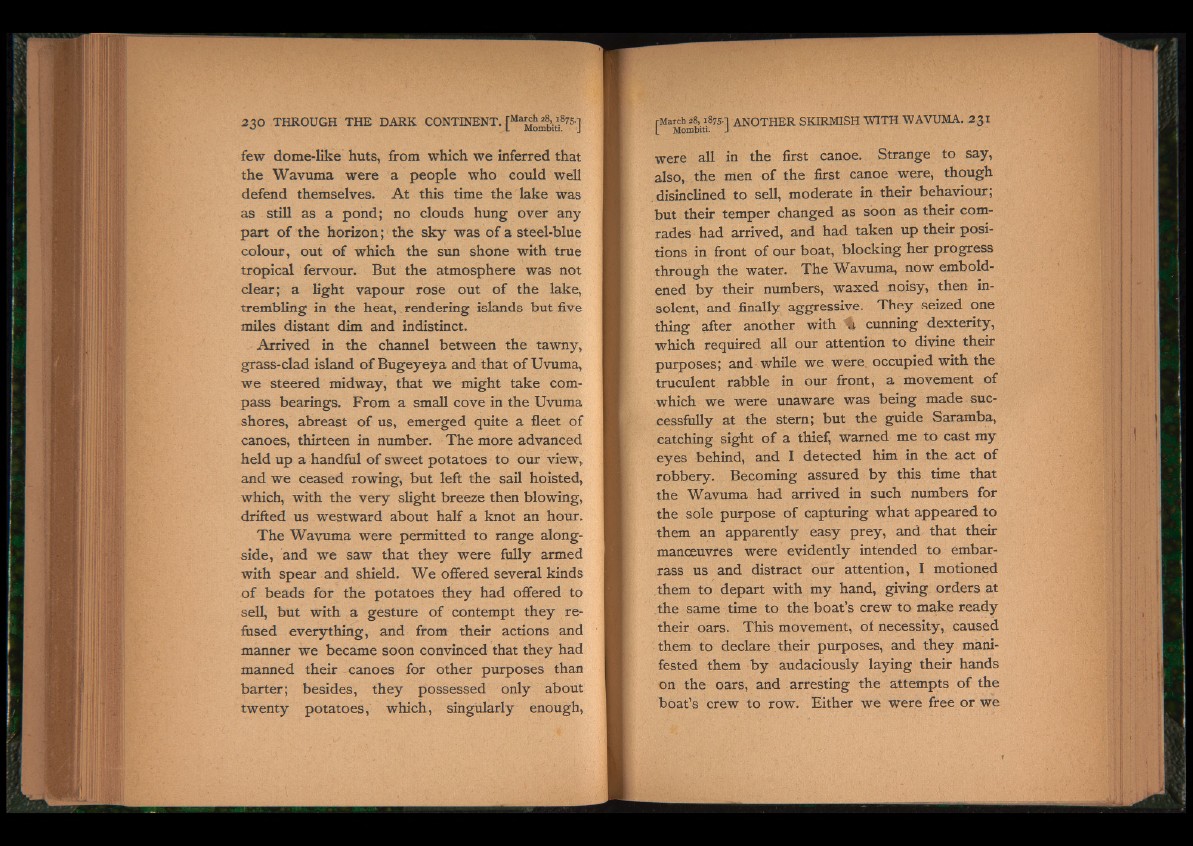
few dome-like huts, from which we inferred that
the Wavuma were a people who could well
defend themselves. A t this time the lake was
as still as a pond; no clouds hung over any
part o f the horizon; the s k y was o f a steel-blue
colour, out o f which the sun shone with true
tropical fervour. But the atmosphere was not
clear; a light vapour rose out o f the lake,
trembling in the heat, rendering islands but five
miles distant dim and indistinct.
Arrived in the channel between the tawny,
grass-clad island o f B u g e y e y a and that o f Uvuma,
we steered midway, that we might take compass
bearings. From a small cove in the Uvuma
shores, abreast o f us, emerged quite a fleet o f
canoes, thirteen in number. T h e more advanced
held up a handful o f sweet potatoes to our view,
and w e ceased rowing, but left the sail hoisted,
which, with the v e r y slight breeze then blowing,
drifted us westward about half a knot an hour.
T h e Wavuma were permitted to range alongside,
and w e saw that they were fully armed
with spear and shield. W e offered several kinds
o f beads for the potatoes they had offered to
sell, but with a gesture o f contempt th e y refused
everything, and from their actions and
manner we became soon convinced that they had
manned their canoes for other purposes than
barter; besides, th e y possessed only about
twenty potatoes, which, singularly enough,
rMarch 28, 1875-1 ANOTHER SKIRMISH WITH WAVUMA. 2 3 1
[ Mombiti. J
were all in the first canoe. Strange to say,
also, the men o f the first canoe were, though
disinclined to sell, moderate in their behaviour;
but their temper changed as soon as their comrades
had arrived, and had taken up their positions
in front o f our boat, blocking her progress
through the water. The Wavuma, now emboldened
b y their numbers, w a x ed noisy, then insolent,
and finally aggressive. T h e y seized one
thing after another with "k cunning dexterity,
which required all our attention to divine their
purposes; and-while we were, occupied with the
truculent, rabble in our front, a movement o f
which we were unaware was being made successfully
at the stern; but the guide Saramba,
catching sight o f a thief, warned me to cast my
eyes behind, and I detected him in the act o f
robbery. Becoming assured b y this time that
the Wavuma had arrived in such numbers for
the sole purpose o f capturing what appeared to
them an apparently easy prey, and that their
manoeuvres were evidently intended to embarrass
us and distract our attention, I motioned
them to depart with my hand, giving orders at
the same time to the boat’s crew to make ready
their oars. This movement, of necessity, caused
them to declare their purposes, and th e y manifested
them b y audaciously laying their hands
on the oars, and arresting the attempts o f the
boat’s crew to row. Either we were free or we